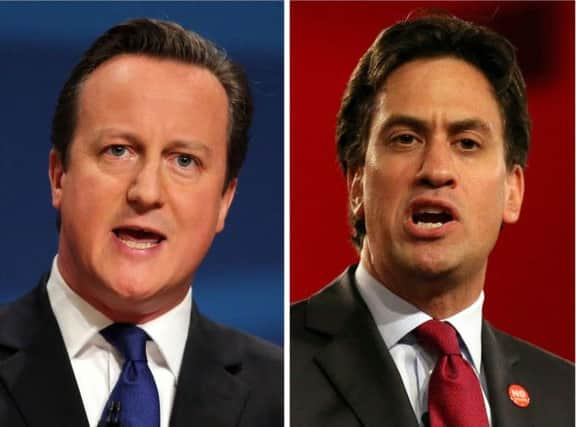Leaders: Personality politics matters


It was a fitting start for a campaign that may ultimately come down to the voters’ assessments of the prime ministerial potential of each of these two men.
This election looks to be the closest for 40 years, with the polls rarely showing a Labour or Conservative lead that is greater than the margin of error.
Advertisement
Hide AdAdvertisement
Hide AdWith the two main parties neck and neck, and with the Liberal Democrats unlikely to win enough seats to put Nick Clegg in the kingmaker position he found himself in after the 2010 contest, politics is currently in a constant state of anticipation about the possible deals that could be required in a hung parliament.
This is understandable. But it also masks another truth about this campaign – that it could well be decided not by the policy positions of each side but by the voters’ verdict on the two candidates for Number 10.
It is often said that British politics has grown more presidential in recent years. But in truth the public has always taken a view of the personalities of the candidates for Downing Street, and made a judgment accordingly.
They were more comfortable with John Major than Neil Kinnock in 1992, just as they were more at ease with Tony Blair than Michael Howard in 2005, and preferred David Cameron to Gordon Brown in 2010.
Policy and economic issues of course played an important part in these contests. But there can be no hiding the fact that the personality of each putative premier was also a factor.
We will not see a genuine American-style head-to-head debate in this campaign between the two candidates for prime minister. This is a pity.
Yes, it is true that TV debates can have an enormous and disproportional influence on the outcome of an election. A good single performance can be the making of a political career – Nick Clegg’s good showing in 2010 arguably deprived Gordon Brown of a shot of staying in power. And it is also true that a slip could conceivably destroy an otherwise sound political career.But voters are entitled to look at the contenders for power, standing side by side, and do a quick “compare and contrast”, however brutal that exercise might be.
Voters must be free to make their judgment about personalities, if only so this judgement can then be put to one side, to be taken into account along with numerous other factors as polling day looms and a decision is reached.
Advertisement
Hide AdAdvertisement
Hide AdAnd yet for those who have neither time nor interest to be engaged in policy analysis, it may be the only comparison they made before deciding who to vote for. It is as simple – or as profound – as that.
We can regret it all we like, but there is no escaping personality politics.
Germanwings aftermath
With every new twist, the Germanwings plane crash in the Alps becomes all the more horrific.
When there were no clues as to the cause of the crash, the gruesome scenes faced by recovery crews on the mountainside were upsetting enough.
The Airbus ploughed into the mountain at 500mph, causing the disintegration of the entire plane, leaving body parts strewn over a huge area. One rescuer described the scene as “surreal”.
In the immediate aftermath some air crews refused to board similar Airbuses until a cause for the crash was identified. For anyone who had a flight booked for the summer holidays, or for an Easter break, the crash gave pause for thought.
The twist the story took yesterday was a chilling one that raised more specific but no less worrying concerns about commercial air travel. From the evidence available, the crash would now appear to be a case of murder-suicide on a grotesquely large scale.
The life of co-pilot Andreas Lubitz will now come under intense scrutiny. Was he depressed? Did he owe money? What were his family circumstances and the state of his relationships? What were his politics? And, inevitably, what were his religious beliefs?
Advertisement
Hide AdAdvertisement
Hide AdRegardless of what particular answers ring the loudest alarm bells, questions are already being asked about checks on the mental stability of aircrew.
Airline safety depends primarily on sound equipment, good maintenance and scrupulous safety procedures. But deep down, all airline passengers know that ultimately it depends on the skill, professionalism and clearheadedness of the two highly-trained human beings in the cockpit.
FOLLOW US
SCOTSMAN TABLET AND MOBILE APPS